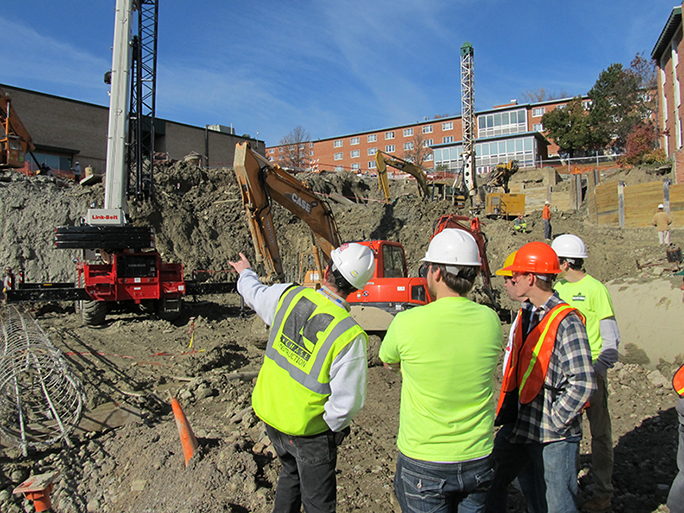
At a glance
 Working alongside industry stakeholders, Alfred State offers a range of comprehensive, targeted programs that get students into their fields with the skill sets industry needs.
Working alongside industry stakeholders, Alfred State offers a range of comprehensive, targeted programs that get students into their fields with the skill sets industry needs.

Last year the United States saw in excess of $1 trillion in new construction projects. Behind the large nationwide gains in construction dollars, many crews are now better educated and managed than ever, with institutions such as Alfred State stepping up with programs designed to be adaptive to industry needs and keep construction moving forward.
In the current issue of “Building the Southern Tier,” Alfred State’s construction-related programs are featured as ways to properly prepare new managers. Leaders from the Civil Engineering Technology Department discuss details of programs related to construction and surveying that match the workforce needs of the publication’s sponsors: The Southern Tier Builders Association and Associate Building Contractors of the Triple Cities.
Working alongside industry stakeholders, Alfred State offers a range of comprehensive, targeted programs that get students into their fields with the skill sets industry needs. For example, the school’s construction management program has been making a difference to New York building sites for more than 40 years, and its grads are some of the most respected members of the construction industry.
Timothy Piotrowski, associate professor with Alfred State’s Civil Engineering Technology Department, notes that the program is accredited by the American Council for Construction Education (ACCE), and the Accreditation Board for Engineering and Technology (ABET).
Piotrowski suggests that a powerful part of the program is the blending of academic with applied courses to create a more balanced approach. Students begin taking courses their first semester and have the opportunity to obtain national construction industry certifications, on the campus, as they matriculate through the program.

For example, in a freshman concrete course they can attempt certification as an American Concrete Institute Concrete Field Testing Technician Grade 1. With this credential, many Alfred State students are working in the construction testing sector their first summer out of school. Last year, 22 students attempted the exam, with 100 percent passing.
Getting students into the industry is what Alfred State’s programs are all about. For example, the construction management curriculum includes a construction safety course that covers the required topics to earn an Occupational Safety and Health Administration (OSHA) 30-hour supervisor’s card. Because the faculty has the credentials to provide the training, students are also offered the opportunity earlier in their program to obtain an OSHA 10-hour card so they can find work on commercial projects during the key summer season.
“The idea is to give our students an opportunity to both train and work toward a career in construction technology. We don’t do internships; we suggest our students go out and find paying jobs in the industry and learn on-site and then come back for another semester to put their new work skills into perspective,” Piotrowski notes.
At the end of the BS construction management program, students sit for an eight-hour exam administered by the American Institute of Constructors.
“This exam covers it all, and our students have performed well above the national average, a testament to the quality and breadth of the construction management program,” he said.
Another industry-responsive course at Alfred State is its program targeted to the surveying community. The college offers associate degrees in survey engineering technology and the four-year surveying and geomatics engineering technology program.
The surveying programs, like construction management, are very hands-on with a strong emphasis on fundamentals. It all leads to the Land Survey Licensure, a credential that requires students to have both academically prepared and worked in the field.
“Every fall and spring, the college hosts a job fair. The industry sets up in our gym to take resumes and network with our grads. Placement levels are high because the industry has come to respect the quality of our students,” said Piotrowski, pointing out that the blend of practical and academic creates valuable employees and construction managers.
“We also participate in the American Associated Schools of Construction Region 1 Construction Competition in Morristown, NJ. We send three teams to compete in three categories: Commercial Building, Design/Build, and Heavy Highway,” says Piotrowski. He reports that the school challenges 17 other colleges on the East Coast.
“Over the last 10 years, we have placed in at least one category and were the only public college last year that placed, a fact that speaks to the quality of our teams,” he said.
